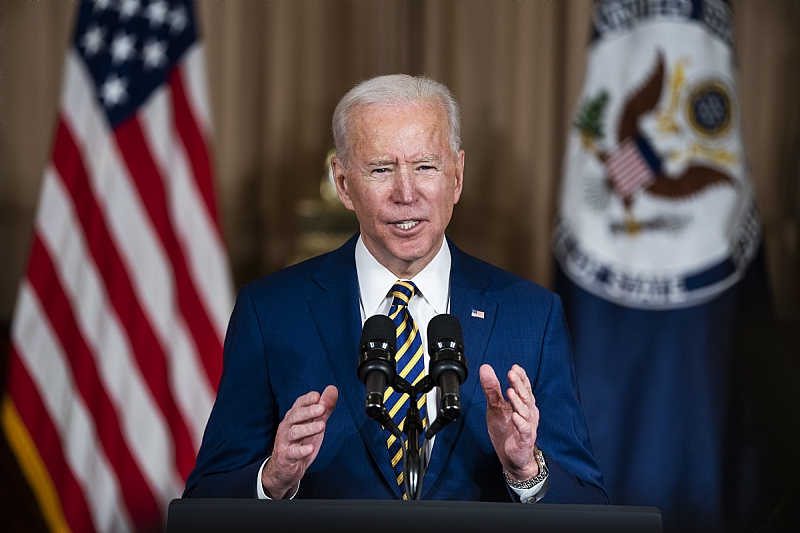
[ad_1]
President Joe Biden made his first public statement on U.S. foreign policy last week. Africa was not mentioned. Does this suggest that the continent will be absent from the considerations of the new administration?
I do not think so.
First, the day after his speech, the new president addressed the 34th African Union (AU) Summit, which was meeting virtually due to the COVID-19 pandemic. He reiterated his commitments to active diplomacy and multilateralism in concert with the AU.
All United States efforts would be in line with America’s core democratic values, which are also enshrined in the AU Constitutive Act and the African Charter on Democracy, Elections and Governance. They have recently been assaulted in Uganda and Ethiopia. But at least a broad American-African consensus to cooperate in prevention and resolution of the problems could emerge.
And days after becoming president, Biden issued an executive order rescinding Trump’s 2017 policy banning all recipients of U.S. government aid from mentioning abortion, let alone advising women about it. The lifting of the gag rule has been applauded by women’s rights groups across Africa for its practical importance and as another signal of its support for their goal of ensuring gender equality.
Second, the themes and priorities outlined by Biden in his foreign policy speech point to vital avenues for productive cooperation between Africa and the United States.
Biden’s international priorities
Biden comes to power with more experience in foreign affairs – including American-African politics – than any of his predecessors.
At the top of its foreign policy agenda are COVID-19 and climate change. On the first day of his tenure, he ordered America to join the World Health Organization and the Paris Agreement on climate change. He also pledged to make diplomacy and multilateralism the main means of American foreign policy.
These important political priorities will benefit African countries. Now it is up to them to pressure the United States to urgently increase its funding on two fronts. First, ensure Africa’s access to affordable and adequate COVID-19 vaccines. Second, strengthen the Green Climate Fund to help Africa mitigate and adapt to global warming.
Several other highlights of Biden’s international priorities should appeal to Africans:
-
Refugee issues. Biden announced his approval of an executive order to restore admission levels, bringing last year’s level to 125,000. He also said that in partnership with other nations, the administration would support efforts to to redress the deprivations that drive people to flee their homes. Finally, he pledged to guarantee more humane sanctuaries for those who must flee.
-
Racism and white supremacy. In another reminder that good foreign policy stems from domestic decency, he said in his foreign policy speech on February 4:
We have taken steps to recognize and combat systemic racism and the scourge of white supremacy in our own country. Racial equity will not only be for one department in our administration, it must be the concern of the whole government in all our federal policies and institutions.
-
Equal rights. Developing his determination to ensure greater respect for diversity and inclusion, nationally and internationally, Biden said, “When we stand up for the equal rights of people around the world – of women and girls, LGBTQ people, Indigenous communities and people with disabilities, people of all ethnicities and religions – we are also ensuring that these rights are protected for our own children here in America. He also stressed the importance of his decision to revoke the ban on Muslims entering the United States, Africa and other regions. He also criticized China for its removal from its Muslim minority, among other contentious issues he vowed not to ignore in Sino-US relations.
-
China. Biden offered to work with China, “when it’s in America’s best interests to do so.” Africans should seize this as an opening for the diplomatic agency to pressure China and the United States to compete in ways that benefit Africa. One example would be advancing the African Continental Free Trade Area, which the United States and China support.
What happens after
Biden won’t ignore immediate crises. His speech focused on only two: Yemen and Myanmar (Burma). In both cases, he advocated the use of diplomacy and multilateralism.
African governments are not directly involved in either. But they can expect the Biden administration to treat African crises alike and, when asked, to assist AU efforts in peacekeeping, prevention of conflicts and regional security.
As African governments consider how best to engage the United States, they should look beyond executive branch to Congress, where African programs have traditionally enjoyed the bipartisan support that Biden promises to encourage. The recent changes in key leadership positions also bode well for the relationship between the United States and Africa.
The first public statement by the new chairman of the powerful House foreign affairs committee, Gregory Meeks, was to call for a new African policy, which he said would be his top priority. Meeks and his Africa subcommittee chair Karen Bass are from the African diaspora, a constituency Biden credits for securing his nomination and election.
Biden also has close personal ties to pro-African members of the Senate Foreign Relations Committee, which he once chaired.
It should also be to Africa’s advantage, as well as the principles and processes that are in Biden’s first foreign policy speech.
John J Stremlau does not work, consult, own stock, or receive funding from any company or organization that would benefit from this article, and has not disclosed any relevant affiliation beyond his academic appointment.
By John J Stremlau, Honorary Professor of International Relations, University of the Witwatersrand![]()
Source link